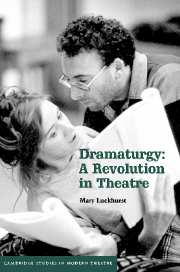Book contents
- Frontmatter
- Contents
- List of illustrations
- Acknowledgements
- List of abbreviations
- 1 Introduction
- 2 Gotthold Lessing and the Hamburg Dramaturgy
- 3 Dramaturgy in nineteenth-century England
- 4 William Archer and Harley Granville Barker: constructions of the literary manager
- 5 Bertolt Brecht: the theory and practice of the dramaturg
- 6 Kenneth Tynan and the National Theatre
- 7 Dramaturgy and literary management in England today
- 8 Conclusion
- Select bibliography
- Index
2 - Gotthold Lessing and the Hamburg Dramaturgy
Published online by Cambridge University Press: 22 September 2009
- Frontmatter
- Contents
- List of illustrations
- Acknowledgements
- List of abbreviations
- 1 Introduction
- 2 Gotthold Lessing and the Hamburg Dramaturgy
- 3 Dramaturgy in nineteenth-century England
- 4 William Archer and Harley Granville Barker: constructions of the literary manager
- 5 Bertolt Brecht: the theory and practice of the dramaturg
- 6 Kenneth Tynan and the National Theatre
- 7 Dramaturgy and literary management in England today
- 8 Conclusion
- Select bibliography
- Index
Summary
Lessing: the first official dramaturg
Gotthold Ephraim Lessing (1729–81) was the world's first officially appointed dramaturg. Though his appointment in Hamburg lasted only two years, from 1767 to 1769, and the venture that inspired it sank rather ignominiously, Lessing's experimental work pioneered reforms of practice and theory throughout Germany. His example led rapidly to the centrality of the dramaturg in German-speaking theatres, and to the spread of official positions in Eastern Europe. In the West the implications of Lessing's appointment for the national reform of theatre practice were not fully absorbed until the mid to late nineteenth century, most notably through Harley Granville Barker and William Archer, and in the twentieth century the first official appointments of literary managers in English-speaking western theatres certainly owed a great deal to Lessing's model of the dramaturg. Similarly, the significance of the Hamburgische Dramaturgie (the Hamburg Dramaturgy), the theatre criticism he published while dramaturg, was not significantly appreciated by western critics until the 1880s and 1890s – yet few would now dispute that these writings rank amongst the most important theoretical documents of eighteenth-century drama. For any student of dramaturgy an understanding of Lessing's work and the cultural background to his appointment is vital.
The National Theatre in Hamburg and Lessing's appointment
There are three important points about the context of Lessing's appointment: his post was created for Germany's first national theatre project; his position was part of a scheme to galvanise a distinctively German dramatic literature; and Lessing, as Germany's foremost man of letters, polemicist, and playwright, was specifically sought out.
- Type
- Chapter
- Information
- DramaturgyA Revolution in Theatre, pp. 24 - 44Publisher: Cambridge University PressPrint publication year: 2006



